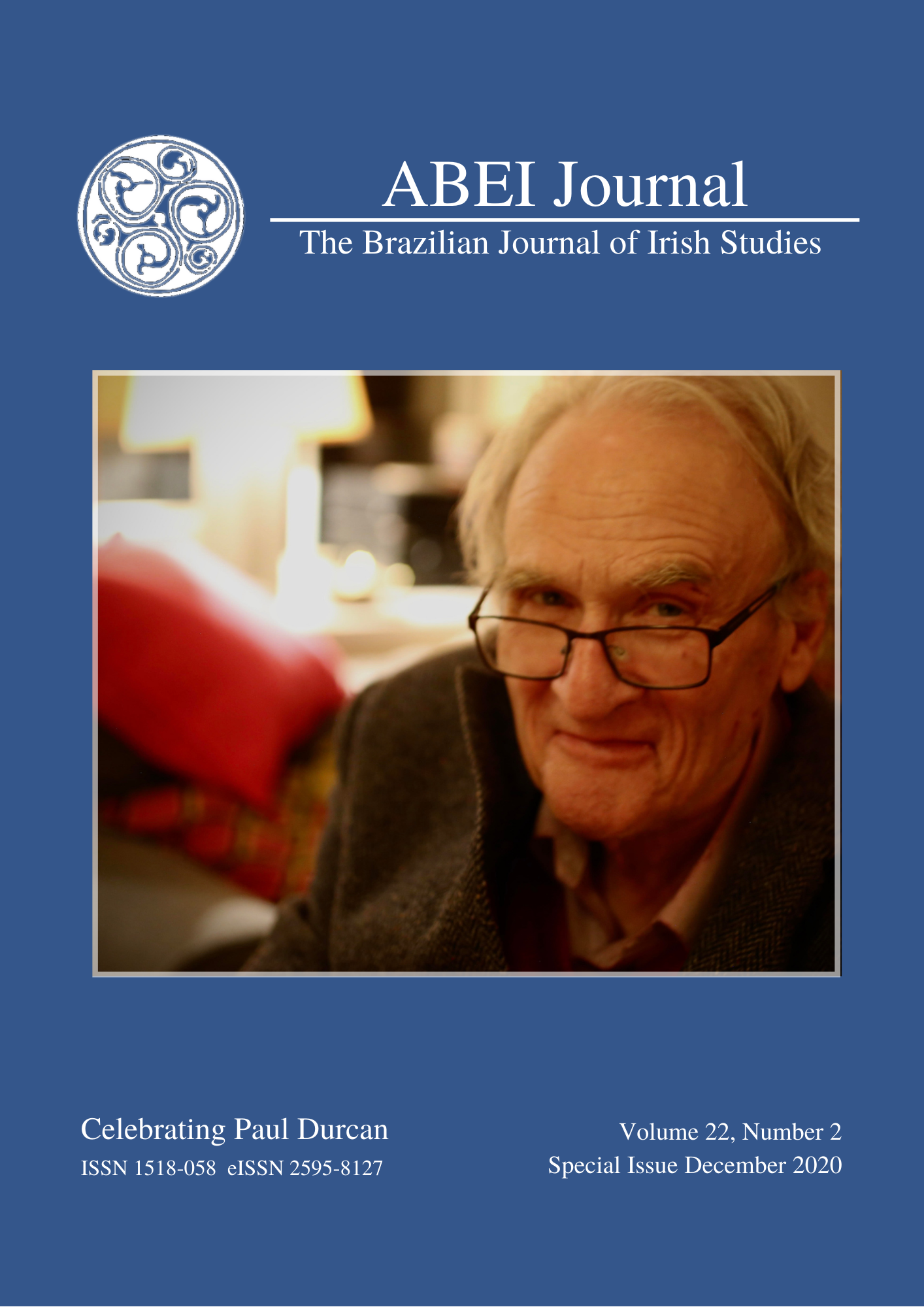Paul Durcan e as Artes Visuais: Gênero, Identidade, Expressão
DOI:
https://doi.org/10.37389/abei.v22i2.180776Parole chiave:
Artes visuais, Transgressão, Gênero, MídiaAbstract
A obra de Paul Durcan encontra uma das suas feições mais atraentes no modo como reconhece fronteiras e explora travessias. As linhas divisórias que a sua poesia cruza regularmente são de vários tipos: são semióticas e intermediais, quando Durcan interpela verbalmente representações noutros sistemas de significação – em particular nas artes visuais; são culturais e políticas, envolvendo o processamento poético de circunstâncias irlandesas ou globais; e questionam identidades de gênero, salientando as perplexidades de mulheres e homens como sujeitos e objetos de uma multiplicidade de inscrições. Este ensaio aborda a escrita (literalmente) transgressiva de Durcan e os desafios intelectuais e disciplinares que ela comporta, ao interrogar o modo como lemos poemas e imagens, mas também como aceitamos a auto-contenção de configurações políticas e identitárias.
Riferimenti bibliografici
Collins, Lucy. ‘‘Performance and dissent: Irish poets in the public sphere’’, Matthew Campbell (ed.), The Cambridge Companion to Contemporary Irish Poetry. Cambridge: C.U.P., 2003, pp. 209-28.
Dunning, William V. Changing Images of Pictorial Space: A History of Spatial Illusion in Painting. New York: Syracuse University Press, 1991.
Durcan, Paul. Jesus Break His Fall. Dublin: Raven Arts, 1980.
Durcan, Paul. Jumping the Train Tracks with Angela. Dublin: Raven Arts / Manchester: Carcanet, 1983.
Durcan, Paul. The Berlin Wall Café. Belfast: Blackstaff, 1985.
Durcan, Paul. Daddy, Daddy. Belfast: Blackstaff, 1990.
Durcan, Paul. Crazy About Women. Dublin: The National Gallery of Ireland, 1991.
Durcan, Paul. Give Me Your Hand. London: Macmillan / National Gallery, 1994.
Durcan, Paul. Praise in Which I Live and Move and Have My Being. London: Harvill Secker, 2012.
Durcan, Paul. The Days of Surprise. London: Harvill Secker, 2015.
Heffernan, James A.W. Cultivating Picturacy. Waco, Tex: Baylor U.P., 2006.
Durcan, Paul. Museum of Words: the poetics of ekphrasis from Homer to Ashbery. Chicago, Ill.: Univ. of Chicago Press, 1993.
Homem, Rui Carvalho. ‘“Private Relations”: Selves, Poems and Paintings – Durcan to Morrissey’, Fran Brearton and Alan Gillis (eds.), Oxford Handbook of Modern Irish Poetry. Oxford: O.U.P., 2012, pp. 282-96.
Jakobson, Roman. ‘‘On Linguistic Aspects of Translation’’ (1959). Lawrence Venuti (ed.), The Translation Studies Reader. 3rd edition. Routledge, 2012, pp.126-31.
Longley, Edna. The Living Stream: Literature and Revisionism in Ireland. Belfast: Bloodaxe, 1994.
Louvel, Liliane. Texte / Image: Images à Lire, Textes à Voir. Presses Universitaires de Rennes, 2002.
Mitchell, W.J.T. Iconology: Image, Text, Ideology. The Univ of Chicago Press, 1986.
Tóibín, Colm (ed.). The Kilfenora Teaboy: A Study of Paul Durcan. Dublin: New Island, 1996.
Dowloads
Pubblicato
Fascicolo
Sezione
Licenza
Copyright (c) 2020 Rui Carvalho Homem

Questo volume è pubblicato con la licenza Creative Commons Attribuzione - Non commerciale 4.0 Internazionale.


